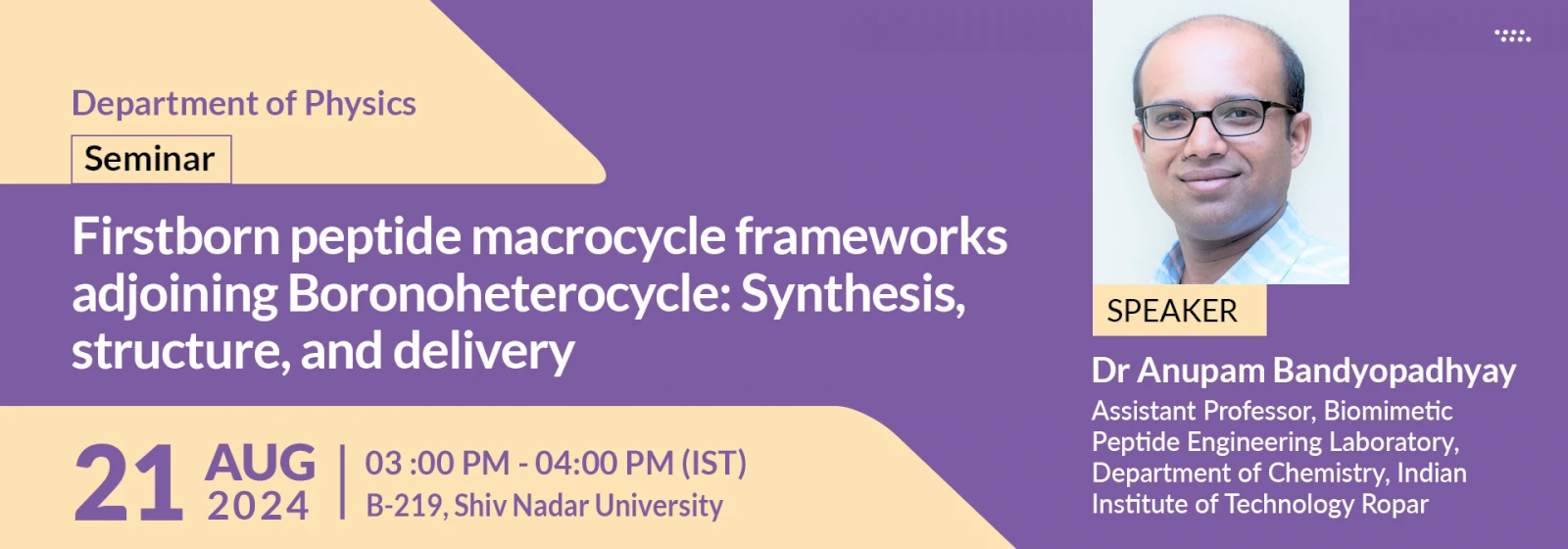Seminar on "Firstborn Peptide Macrocycle Frameworks Adjoining Boronoheterocycle: Synthesis, Structure, and Delivery" by Dr. Anupam Bandyopadhyay
The Department of Physics, School of Natural Sciences, is pleased to invite you to a seminar on the 21st of August, 2024, from 3:00 PM to 4:00 PM (IST) in B-219. The seminar will be presented by Dr. Anupam Bandyopadhyay, Assistant Professor at the Biomimetic Peptide Engineering Laboratory, Department of Chemistry, Indian Institute of Technology Ropar. Dr. Bandyopadhyay will discuss his latest research on "Firstborn Peptide Macrocycle Frameworks Adjoining Boronoheterocycle: Synthesis, Structure, and Delivery." This seminar will delve into the synthesis, structure, and potential applications of these novel peptide macrocycle frameworks, with a focus on targeted delivery systems. We encourage all students, faculty, and researchers to attend this insightful session and participate in the discussion. This event is an excellent opportunity to engage with cutting-edge developments in peptide engineering and explore their implications for future research in chemistry and related fields. We look forward to your presence.
Abstract:
In recent years, peptide chemical modifications with novel chemical entities have found remarkable biochemical applications in drug discoveries and the preparation of unique biomaterial frameworks. Our efforts in engineering boronopeptides experienced that cyclopeptide frameworks composed of borono-heterocyle are rarely exploited and could leverage prodigious opportunities. We conceptualized regioselective crosslinking between the N-terminus and backbone cysteine via deploying a strategically designed bis-electrophile in order to attain our goal. This planned method enables the rapid and quantitative grafting of azaborolo thiazolidine (ABT) in peptide frameworks, which is evident through NMR structural analysis. Crosslinking offers the preparation of complex disulfide-rich peptide structures, viz. α-conotoxin and gomesin, without any interference.ABT-grafted peptides are fairly stable in endogenous stimuli, but one can reverse it by the treatment of appropriate α-nucleophiles. Crosslinked cyclopeptides display two important functional moieties, thiazolidine and Wulff-boronate, which can judiciously or individually find significant applications, such as bioconjugation, cell penetration, drug delivery, etc. As a proof of concept, we showed this crosslinking method could fold a pro-apoptotic peptide to its better active state and facilitate intracellular delivery in cancer cells with the assistance of Wulff-boronate ‘click’ handle via salicylhydroxamic boronate formation. Finally, I will discuss a combined therapy for the effective treatment of cancer using a crosslinked pro-apoptotic peptide along with the FDA-approved Lanreotide drugs.

Share this: